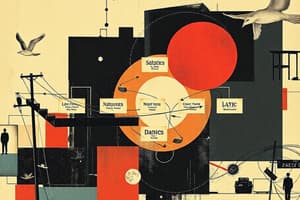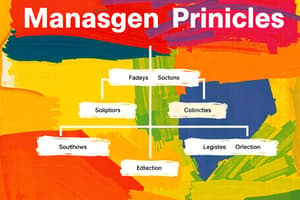Podcast
Questions and Answers
What does efficiency in management primarily emphasize?
What does efficiency in management primarily emphasize?
- Minimizing resource usage (correct)
- Achieving organizational goals
- Maximizing employee satisfaction
- Setting long-term strategies
Which of the following best describes the role of management?
Which of the following best describes the role of management?
- Setting long-term financial goals
- Creating new resources
- Coordinating employee efforts to achieve objectives (correct)
- Overseeing individual employee tasks
Which function of management involves defining goals and establishing strategies?
Which function of management involves defining goals and establishing strategies?
- Organizing
- Controlling
- Directing
- Planning (correct)
How are efficiency and effectiveness related in management?
How are efficiency and effectiveness related in management?
What is a key aspect of controlling in management?
What is a key aspect of controlling in management?
What is a consequence of poor management in an organization?
What is a consequence of poor management in an organization?
Which of the following best defines the term 'effectiveness' in management?
Which of the following best defines the term 'effectiveness' in management?
Which of these is NOT one of the four primary functions of management?
Which of these is NOT one of the four primary functions of management?
What is a key characteristic of organizations?
What is a key characteristic of organizations?
Which type of organization is primarily funded by the state budget?
Which type of organization is primarily funded by the state budget?
What type of organization aims to generate profits for private owners?
What type of organization aims to generate profits for private owners?
What do organizations develop to guide the behavior of their members?
What do organizations develop to guide the behavior of their members?
Which of the following statements accurately describes non-governmental organizations (NGOs)?
Which of the following statements accurately describes non-governmental organizations (NGOs)?
What primarily distinguishes managers from non-managers within organizations?
What primarily distinguishes managers from non-managers within organizations?
Why is it essential for people to be part of organizations?
Why is it essential for people to be part of organizations?
Which of the following best describes the role of management in organizations?
Which of the following best describes the role of management in organizations?
What is the primary goal of the organizing function in management?
What is the primary goal of the organizing function in management?
Which aspect is NOT a part of the directing function in management?
Which aspect is NOT a part of the directing function in management?
What do managers primarily do in the controlling function?
What do managers primarily do in the controlling function?
Which of the following is NOT one of Mintzberg's groups of managerial roles?
Which of the following is NOT one of Mintzberg's groups of managerial roles?
Which role is included in the interpersonal roles defined by Mintzberg?
Which role is included in the interpersonal roles defined by Mintzberg?
Which statement best describes the function of directing in management?
Which statement best describes the function of directing in management?
The process of grouping tasks and defining authority in an organization is part of which management function?
The process of grouping tasks and defining authority in an organization is part of which management function?
What is a key purpose of motivation in the directing function?
What is a key purpose of motivation in the directing function?
What role do interpersonal skills play in management?
What role do interpersonal skills play in management?
What is a characteristic of technical skills needed by top-level managers?
What is a characteristic of technical skills needed by top-level managers?
Which of the following principles argues that management skills are transferable?
Which of the following principles argues that management skills are transferable?
What argument supports the universality of management processes?
What argument supports the universality of management processes?
How does culture affect management practices according to the management is culture-bound argument?
How does culture affect management practices according to the management is culture-bound argument?
What is the primary focus of political skills for managers?
What is the primary focus of political skills for managers?
Which of the following relates to management knowledge being universal?
Which of the following relates to management knowledge being universal?
What best describes the relationship between interpersonal skills and the delegation process?
What best describes the relationship between interpersonal skills and the delegation process?
What role does a manager perform when attending ceremonial functions?
What role does a manager perform when attending ceremonial functions?
In which managerial role does the manager hire and train employees?
In which managerial role does the manager hire and train employees?
Which role involves the manager acting as a mediator between the organization and outsiders?
Which role involves the manager acting as a mediator between the organization and outsiders?
What is the primary function of a manager in the monitor role?
What is the primary function of a manager in the monitor role?
Which decisional role involves making changes or improvements to organizational activities?
Which decisional role involves making changes or improvements to organizational activities?
In the resource allocator role, what is the manager primarily responsible for?
In the resource allocator role, what is the manager primarily responsible for?
Which of the following is NOT one of the four basic skills needed by all managers?
Which of the following is NOT one of the four basic skills needed by all managers?
Which skill helps managers analyze and diagnose complex situations?
Which skill helps managers analyze and diagnose complex situations?
Study Notes
Organizations
- Organizations are arrangements of people working together to achieve a specific goal.
- Organizations have a clear purpose, typically expressed in terms of goals, which require people to work and make decisions.
- Organizations have systematic structures with rules and regulations to guide behavior.
- Organizations can be classified by size, nature of business, location, and ownership.
Types of Organizations
- Public organizations are state-owned, non-profit, financed by government budgets (e.g., Cairo University, Ministry of Health).
- Business organizations are profit-seeking and privately owned (e.g., CIB, QNB, Orange, Vodaphone).
- Non-governmental organizations (NGOs) are independent, non-profit, civil society entities, financed by donations, and operate independently of the government (e.g., community societies, charities).
Management
- Management involves setting an organization’s strategy and coordinating employee efforts to achieve objectives using available resources (financial, natural, technological, human).
- Management is a process of getting things done effectively and efficiently through people.
- Efficiency means doing tasks correctly (doing things right) and getting the most output from the least amount of input.
- Effectiveness means doing the right things that help the organization achieve its goals.
- Efficiency focuses on the means of getting things done, while effectiveness focuses on attaining organizational goals.
Functions of Management
- There are four primary management functions: planning, organizing, directing, and controlling.
Planning
- Planning defines goals, establishes strategy, and develops plans to coordinate activities.
- Planning focuses on the future and determines an organization’s direction.
Organizing
- Organizing means arranging and structuring work to reach organizational goals.
- It involves tasks, grouping, reporting structures, decision-making, and establishing formal authority and its flow.
Directing
- Directing focuses on leadership, communication, and motivation to ensure employees perform effectively and achieve goals.
- Directing involves guidance on procedures and methods, open communication, and motivation to enhance performance.
Controlling
- Controlling involves monitoring, comparing, and correcting work performance.
- It includes setting performance standards, measuring performance, comparing it to standards, and taking corrective action when necessary.
Management Roles (Mintzberg)
- Managers perform ten different but interrelated roles, categorized by relationships, information transfer, and decision-making.
Interpersonal Roles
- Figurehead: Managers perform symbolic activities like attending ceremonies.
- Leader: Managers hire, train, motivate, and guide subordinates.
- Liaison: Managers act as intermediaries between the organization and external entities.
Informational Roles
- Monitor: Managers seek and receive information about factors affecting their activities, both internal and external.
- Disseminator: Managers transmit information to subordinates, peers, and superiors within the organization.
- Spokesperson: Managers represent the organization while interacting with outsiders.
Decisional Roles
- Entrepreneur: Managers initiate changes and improvements in the organization.
- Disturbance Handler: Managers take corrective action during unexpected crises.
- Resource Allocator: Managers divide work and delegate authority among subordinates.
- Negotiator: Managers represent the organization in negotiations with both insiders and outsiders.
Management Skills
- Management skills refer to managers’ expertise in performing managerial tasks and assignments (e.g., preparing reports, motivating employees).
- Four basic skills are needed by all managers: conceptual, interpersonal, technical, and political.
Conceptual Skills
- Conceptual skills involve analyzing and diagnosing complex situations.
- They help managers see how things fit together and make better decisions.
Interpersonal Skills
- Interpersonal skills involve working effectively with others, individually and in groups.
- These skills enable managers to communicate, motivate, and delegate effectively.
Technical Skills
- Technical skills refer to job-specific knowledge and techniques needed to perform work tasks.
- For top-level managers, these skills often relate to industry knowledge and organizational processes.
- For middle- and lower-level managers, these skills are more specialized and related to specific areas like finance, human resources, marketing, and production.
Political Skills
- Political skills involve building a power base and establishing the right connections.
Universality of Management
- There is debate about whether the management process and its functions are universal.
Arguments for Universality
- The fundamental functions (planning, organizing, staffing, leading, controlling) are performed by all managers in all organizations.
- Management knowledge is universal.
- Management skills and principles are transferable between individuals, organizations, and countries.
Arguments Against Universality
- Different countries have different cultures and economic development levels.
- Culture, defined by attitudes, beliefs, and values, influences management principles and their application.
Studying That Suits You
Use AI to generate personalized quizzes and flashcards to suit your learning preferences.
Related Documents
Description
This quiz explores the fundamental concepts of organizations, their types, and the principles of management. Learn about public, business, and non-governmental organizations, and understand the role of management in coordinating efforts toward goals. Test your knowledge on how organizations function and their structural characteristics.




